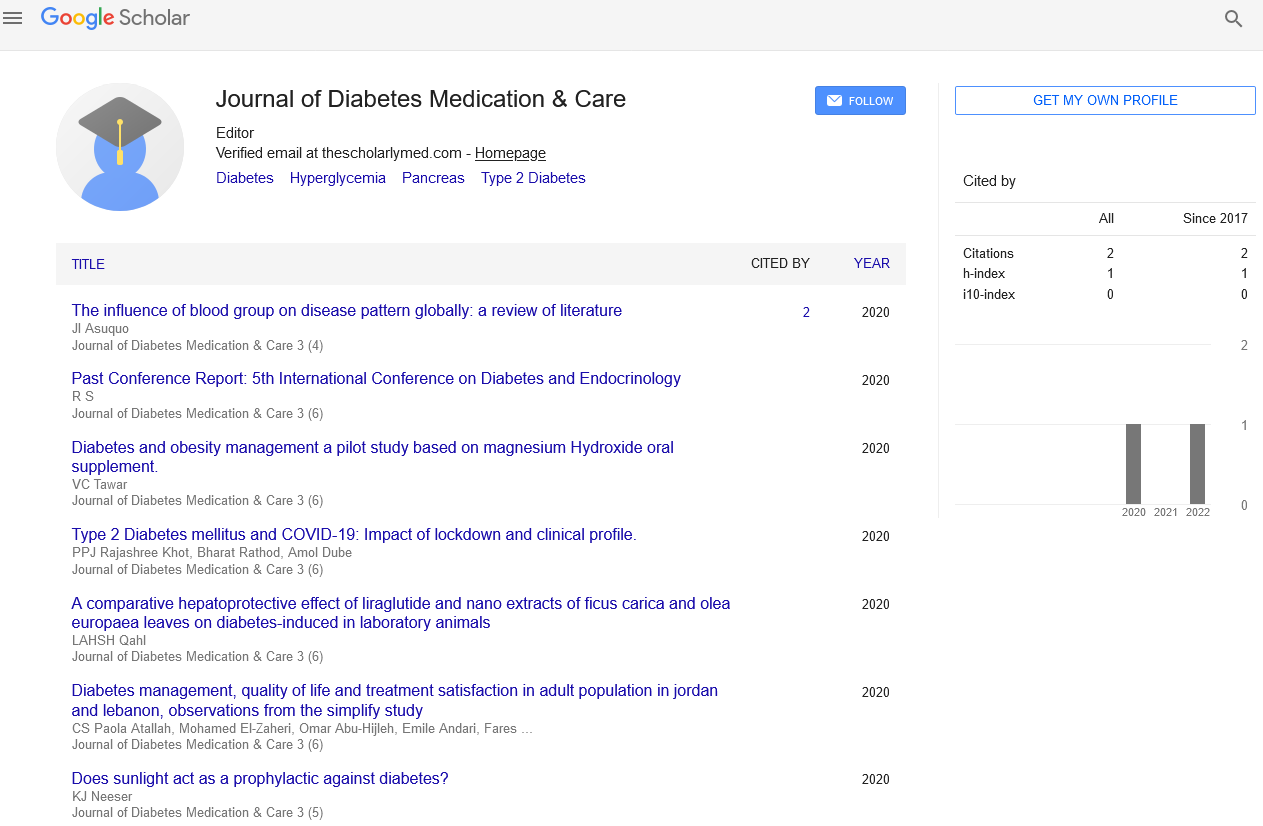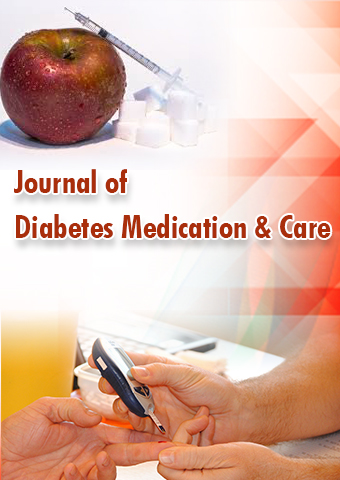Perspective - Journal of Diabetes Medication & Care (2023) Volume 6, Issue 5
Understanding Gestational Diabetes: Causes, Risks, and Management
- Corresponding Author:
- Sarah Mantwill
Department of Endocrinology, University of Wurzburg, Wurzburg, South Africa
E-mail: srah.mawill@usi.ch
Received: 04-Sep-2023, Manuscript No. JDMC-23-119067; Editor assigned: 07-Sep-2023, PreQC No. JDMC-23-119067 (PQ); Reviewed: 21-Sep-2023, QC No. JDMC-23- 119067; Revised: 03-Oct-2023, Manuscript No. JDMC-23-119067 (R); Published: 12-Oct-2023, DOI: 10.37532/JDMC.2023.6(5).118-120
Introduction
Pregnancy is a beautiful and transformative journey for any woman. However, it can also bring about various challenges, one of which is gestational diabetes. Gestational diabetes is a temporary condition that affects some pregnant women, and it demands special attention and care to ensure the health and well-being of both the mother and the developing baby. In this comprehensive article, we will explore the nuances of gestational diabetes, including its causes, risk factors, complications, and management, empowering expectant mothers and their healthcare providers with the knowledge needed to navigate this condition with confidence.
Description
What is gestational diabetes?
Gestational Diabetes Mellitus (GDM) is a type of diabetes that occurs during pregnancy. Unlike pre-existing diabetes, which women may have before becoming pregnant, gestational diabetes develops during pregnancy and typically resolves after the baby is born. This condition is characterized by elevated blood sugar levels, which, if left unmanaged, can pose significant risks to both the mother and the developing fetus.
Causes of gestational diabetes
The exact cause of gestational diabetes isn’t fully understood, but it is believed to result from a combination of hormonal changes and insulin resistance during pregnancy. Here’s a breakdown of the primary causes:
Hormonal changes: During pregnancy, the placenta produces hormones that help the baby grow and develop. Some of these hormones can also interfere with the body’s ability to use insulin effectively. This results in a condition known as insulin resistance, where the body’s cells don’t respond as well to insulin, leading to elevated blood sugar levels.
Insulin resistance: As pregnancy progresses, the body needs more insulin to regulate blood sugar. If the pancreas can’t produce enough insulin to meet these increased demands, blood sugar levels rise, resulting in gestational diabetes.
Risk factors for developing gestational diabetes
While any pregnant woman can develop gestational diabetes, some factors increase the risk. These include:
• Age: Women over 25 are more likely to develop gestational diabetes, with the risk increasing
as age advances.
• Family history: A family history of diabetes, especially among close relatives, can increase
the risk of gestational diabetes.
• Obesity: Being overweight or obese before pregnancy significantly raises the risk of gestational
diabetes. Excess body fat can lead to insulin resistance.
• Previous gestational diabetes: If a woman
had gestational diabetes during a previous
pregnancy, she is at higher risk of developing
it in subsequent pregnancies.
• Polycystic Ovary Syndrome (PCOS): Women with PCOS are more susceptible
to insulin resistance, which increases the
likelihood of gestational diabetes.
• Ethnicity: Some ethnic groups, such
as African American, Hispanic, Native
American, and Asian American women,
have a higher risk of gestational diabetes.
• Inactivity: Lack of physical activity can
contribute to weight gain and insulin
resistance, increasing the risk of gestational
diabetes.
Complications of gestational diabetes
Gestational diabetes, if left untreated or poorly managed, can lead to a range of complications for both the mother and the baby. It is crucial to address these complications proactively to ensure a healthy pregnancy and delivery.
• Macrosomia: Babies born to mothers with
uncontrolled gestational diabetes are at risk
of excessive growth (macrosomia), which
can lead to complications during delivery.
• Hypoglycemia: After birth, babies of
mothers with gestational diabetes may
experience low blood sugar levels, known as
hypoglycemia.
• Preterm birth: Gestational diabetes can
increase the risk of preterm birth, which can
be associated with a range of health issues
for the baby.
• Preeclampsia: Women with gestational
diabetes are at a higher risk of developing
preeclampsia, a condition characterized by
high blood pressure and damage to organs
like the liver and kidneys.
• Type 2 diabetes: Women who experience
gestational diabetes are at a higher risk of
developing type 2 diabetes later in life.
• Respiratory distress syndrome: Babies
of mothers with gestational diabetes may
have an increased risk of respiratory distress
syndrome, which affects their ability to
breathe.
• Neonatal hypoglycemia: Low blood
sugar levels in newborns can lead to
seizures, developmental issues, and other
complications.
Management of gestational diabetes
The good news is that gestational diabetes can be managed effectively with lifestyle changes, medical monitoring, and sometimes medication. It is essential to work closely with a healthcare team to create an individualized management plan. Here are the key components of managing gestational diabetes:
• Healthy eating: A balanced diet is crucial
for managing blood sugar levels. Consult
with a registered dietitian to create a meal
plan that provides adequate nutrition while
controlling carbohydrates to keep blood
sugar in check.
• Regular physical activity: Engaging in
regular, moderate-intensity exercise is an
important part of managing gestational
diabetes. This helps improve insulin
sensitivity and regulate blood sugar levels.
Consult with your healthcare provider
to establish a safe exercise routine during
pregnancy.
• Blood sugar monitoring: Regular monitoring
of blood sugar levels is essential. This can
be done through daily self-testing using a
glucose meter. Keeping a record of blood
sugar levels helps healthcare providers make
necessary adjustments to the treatment plan.
• Medication: In some cases, dietary and
lifestyle changes may not be sufficient
to control blood sugar levels. In such
situations, insulin or oral medications may
be prescribed by a healthcare provider.
• Frequent check-ups: Regular prenatal checkups
are vital for monitoring the progress of
both the mother and the baby. Healthcare
providers will assess the baby’s growth and
well-being and adjust the treatment plan as
needed.
• Educational programs: Many healthcare
providers offer diabetes education programs
specifically designed for pregnant women
with gestational diabetes. These programs
provide valuable information on managing
the condition, including meal planning,
blood sugar monitoring, and lifestyle
changes.
• Support and counseling: Managing
gestational diabetes can be emotionally
challenging. Receiving support from healthcare providers, family, and friends,
or joining support groups can help alleviate
stress and anxiety.
Conclusion
Gestational diabetes is a temporary condition that can be managed effectively with proper medical care and lifestyle adjustments. By understanding the causes, risk factors, and potential complications associated with gestational diabetes, expectant mothers can take proactive steps to protect their health and the well-being of their babies. With the guidance of healthcare providers and a commitment to a healthy lifestyle, women with gestational diabetes can navigate this challenge and look forward to a safe and successful pregnancy.
Remember, gestational diabetes is just one aspect of pregnancy, and with the right care and support, most women with this condition go on to have healthy pregnancies and deliver healthy babies. If you suspect you have gestational diabetes or have been diagnosed with it, consult with your healthcare provider to create a personalized plan for managing your condition and ensuring the best possible outcome for both you and your baby.

